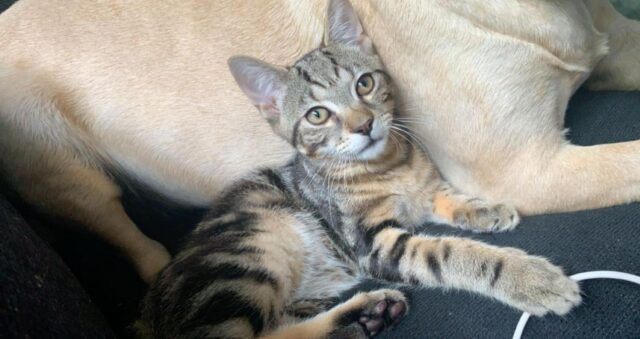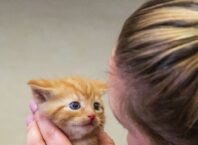In the run up to Bonfire Night, vet charity PDSA is urging owners to take steps to reduce fireworks stress for their pets, after a cat named Boo was nearly scared to death due to the loud bangs.
Two-year-old tabby cat Boo was taken to Stoke PDSA Pet Hospital last October when his owner, Shelly Chatterton (26), found him straining and crying in his litter tray. Shelly said: “I was keeping a close eye on him as he wasn’t his usual active self. But when he cried out in pain when I picked him up, I knew something was seriously wrong.”
At PDSA, Boo was immediately admitted and treated for a blocked bladder. PDSA Vet, Hester Stephens, explained: “A blocked bladder means they can’t urinate at all and this is very serious – without treatment, sadly it’s often fatal.
“The condition is commonly brought on by stress, which some cats can be particularly susceptible to, and can be triggered by any sudden or unexpected changes in their environment.”
Shelly continued: “It was late October, and the only thing different for him was that for the previous few weeks fireworks had been going off at all sorts of times in the field next to my house. They were often right overhead and really loud, and there wasn’t much we could do to hide the noise as they were unpredictable.”
Thankfully, Boo survived his brush with death and was able to go home after a couple of days of intensive care. This year, with PDSA’s help Shelly has since taken steps to reduce Boo’s stress levels, and prepare him for this year’s fireworks.
The 2022 PDSA Annual Wellbeing (PAW) Report found that an estimated 4.1 million dogs and 3.3 million cats in the UK are scared of fireworks. The vet charity for pets in need is urging owners to take steps to help reduce fireworks stress in pets – owners can download PDSA’s free fireworks guide at www.pdsa.org.uk/fireworkready
Here are some of PDSA Vets’ top tips on helping pets through Bonfire Night:
Prepare for an ‘early night’ – note the dates of any local fireworks displays so you can prepare. On the day, walk dogs early before it gets dark, and keep cats indoors. Bring any pets living outdoors (rabbits and guinea pigs) inside for the night.
Secure your home – keep doors, windows, dog and cat flaps closed and locked so pets can’t accidentally escape. Close all curtains to help reduce light and sound from outside.
Create a fireworks den – ideally done in advance, creating a cosy space where your pet feels safe and secure can help them cope. Fill it with familiar blankets, their favourite toys and treats, plus pillows and cushions to help absorb the loud noises. Let them hide here whenever they want.
Pick a soundtrack – Play sounds that help disguise the whizzes and bangs of fireworks. This could be music with a repetitive beat, loud classical music or even white noise – pick whatever keeps you and your pet calmest.
Use a pheromone plug-in – these are scents that we can’t smell, but that help to relax pets and keep them calm. Ideally start using them a few weeks in advance.
Be ready with reassurance – if your pet takes comfort in attention or affection for you, continue to provide this as you normally would. Don’t ignore them if they come to you, try to react as you usually would with them and stay calm yourself as this helps to reassure your pet that they’re safe.
Plan ahead – if your pet really struggles with fireworks this season, start early to prepare them. You can use a process called ‘desensitisation’ to help them learn that fireworks noises aren’t scary, but this can take several months. The earlier you start, the easier things will be for them next time.
PDSA sees around 1,300 pets every year with fireworks related issues, such as injuries and phobias. 82% of pet owners agree that fireworks should only be allowed on certain dates and times.
Every day across its 48 Pet Hospitals, PDSA protects the special bond between owners and their four-legged friends. The teams provide veterinary care to sick and injured pets whose owners otherwise couldn’t afford to pay the full cost of treatment. The charity has been keeping people and pets together for over a hundred years. Find out more: pdsa.org.uk/learn-why-were-special




